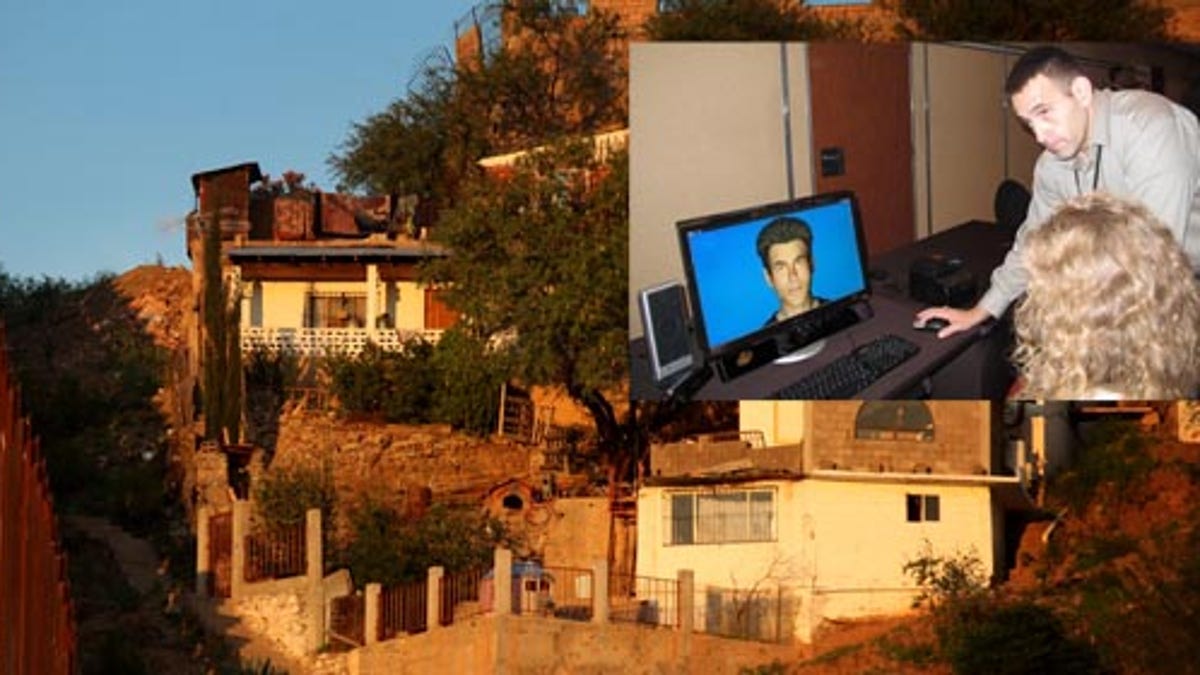
NOGALES, AZ - JULY 6: The border wall between the U.S. and Mexico is seen July 6, 2012 in Nogales, Arizona. The president-elect of Mexico, Enrique Peña Nieto, stated that he wants to expand his country's drug-war partnership with the United States but that he would not support the presence of armed American agents in Mexico. (Photo by Sandy Huffaker/Getty Images) (2012 Getty Images)
U.S. Customs and Border Protection has a new officer working in Arizona.
He’s hardworking, bilingual, a bit mechanical and not very social with other employees, but he doesn’t complain about long hours or troublesome commuters.
That’s because unlike his flesh-and-bone counterparts this worker is something straight out of a science fiction film. Once given to the realm of films like Blade Runner and the Terminator, this CBP worker is an avatar – a virtual border guard who resides in a kiosk created by researchers at the University of Arizona to help expedite certain border crossings.
Located at the U.S.-Mexico border crossing in Nogales, Arizona, the avatar, who sports a clean-cut look of thick black hair and a striped gray tie, is part of an expansion of the CBP’s Trusted Traveler Program. The idea behind the program is to “provide expedited travel for pre-approved, low-risk travelers through dedicated lanes and kiosks,” the CBP stated.
The Trusted Traveler program was created after the 9/11 attacks, as security ramped up and became longer. To qualify for the program, travelers must undergo a thorough background check against criminal, law enforcement, customs, immigration, agriculture, and terrorist as well as have biometric fingerprint checks and a personal interview with a CBP Officer following their avatar questioning.
As of now, the avatar is monitored by a live and breathing CBP officer who takes cues via an iPad tablet, which they can then use in a follow-up interview. Using speech recognition and voice anomaly-detection software, the avatar will flag any questionable responses for a CBP officer to follow up on, Scientific American reported.
One of the ways the CBP hopes to use these kiosks is to administer preliminary interviews to save time during an actual face-to-face questioning.
There are worries, however, that the technology may not be as effective as the CBP and researchers hope.
“A lot of this is taking technology that is coming right out of research and implementing IT? right on the ground,” said Lillie Coney, the associate director of The Electronic Privacy Information Center (EPIC), a Washington D.C.-based a public interest research center focusing on civil liberties and public privacy issues. “If we implement programs like this it becomes more likely that travelers from our country will be subjected to this when they travel abroad.”
The avatar kiosks have the potential to draw the same amount of criticism that the Department of Homeland Security's Future Attribute Screening Technology (FAST) program has. The FAST program measures travelers’ pulse rate, skin temperature, breathing, facial expression, body movement, pupil dilation and other physiological and behavioral factors to determine their security risk.
“Anytime you try to automate a process around security, the major question is ‘is this an appropriate use of technology?’” Coney said.
Researchers said that the avatar makes people answer the questions as if they were talking to a human being.
“It was like they were talking to Moviefone," said Aaron Elkins, a University of Arizona postdoctoral researcher in the Management Information Systems department, to Scientific American of the lab tests prior to the avatar. “When an avatar was added, people treated it almost like a person, at times even referring to it as "sir."
The Nogales border crossing is one of the major conduits for drugs entering the U.S. from Mexico, with border patrol agents seizing over 77 kilograms of cocaine and three kilograms of methamphetamine totaling more than $2 million from two men trying to cross the border.
Earlietr this year, the U.S. Consulate in Nogales, Mexico announced a travel warning for the area.
“U.S. travelers should be aware that the Mexican government has been engaged in an extensive effort to counter [Transnational Crime Organizations] which engage in narcotics trafficking and other unlawful activities throughout Mexico,” the warning stated. “The TCOs themselves are engaged in a violent struggle to control drug trafficking routes and other criminal activity. As a result, crime and violence are serious problems throughout the country and can occur anywhere.”
